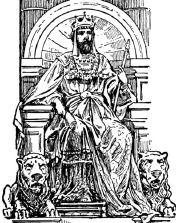
Isaiah 38:1-6 / Matthew 8:5-13
As a general practice, one should not judge the quality of another's confession. We may be our brother's keeper, but we are not his copy editor or speech writer for his most humble and abject moments before the Lord. Even so, one cannot help but find something off-putting about King Hezekiah's appeal to God when confronted in his illness by Isaiah the prophet. I beseech you, O Lord, he says, remember how I have walked before you in truth, and with a perfect heart, and have done what is good in your sight. Now, there may be many ways to return to God after we have gone astray, but asserting one's perfection is not typically one of them, nor protesting one's own goodness before the majesty of God. Yet, for all that, God heard Hezekiah's prayers, and not only was the king delivered from his illness, but the great city was also delivered, not from sickness but from the ravages of the Assyrians.
What this suggests is that we have mistaken what true repentence is. The error is actually not to hard to see. In presuming that Hezekiah ought to have spoken a litany of grave sins, we are thinking that the essence of returning to God is in self-accusation. But, surely that cannot be so. Our sins, however dark, are not themselves the source of illumination, and many a misguided penitent has made himself worse by fixing his mind on the wretchedness, imagined or real, of his sinful life. Sins must certainly be acknowledged, and not simply generically, but in their full specificity, without either exaggeration or diminution. Yet, we see not only the way that sin is wrong, but more crucially the way from sin back to God, not in the gloom of our infidelity, but in the radiant light of God's fidelity.
This is what makes sense of Hezekiah's prayer. This pious king knew of the promises the Lord God had made to his people Israel, and to the line of David, should they keep to his covenant. In asserting how he had observed God's holy Law, how he had zealously and vigorously preserved the true faith against the continuing temptation to lapse into an easy idolatry in imitation of his neighbors, Hezekiah is giving witness to God's faithful promise to protect the kings of Judah and the people they ruled. Note that, having asserted his own fidelity, Hezekiah wept with great weeping. In appealing to the righteousness of God in keeping his promises, Hezekiah knew the profound insufficiency of his own goodness. No amount of pleading his personal piety would be sufficient cause to hope that he and his kingdom might be saved. It is only in light of his faith that God might remain true where even the truest of men goes false, only in that light that he could make his appeal.
This same recognition that our restoration in God comes from God's faithfulness and not our own righteousness is the great faith which Jesus commended in the centurion. The centurion, after all, admitted his own unworthiness to have Jesus come under his roof, but not especially because he saw himself a wretched sinner. It was in his profession of Jesus as one who has supreme authority that the centurion made both his appeal and his confession of unworthiness.
As Lent begins, we would do ourselves a favor to remember that God is not impressed by our self-loathing. Lent is not a season for gloomy and morose recitations of our vice before the almighty. Rather, Lent prompts us once again to remember God's unwavering fidelity to his promises, and he has promised us nothing less than to feast with Abraham and Isaac and Jacob in the kingdom of heaven. We have been invited, and God never revokes his promises. As we recall our own string of broken promises, it is good to remember at the start that he to whom we turn is not fickle or false. I have heard your prayer, says the Lord to each penitent soul, and I have seen your tears ... and I will deliver you.
2 comments:
Wow, I am so very glad you are my brother. Just the message I needed to have on this day. Love, Cyndi
Glad to be of service!
Dominic Holtz, O.P.
Post a Comment